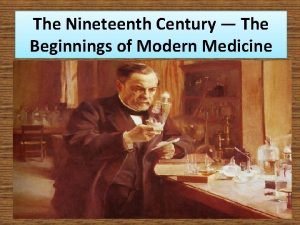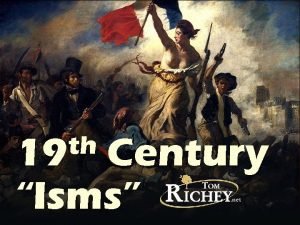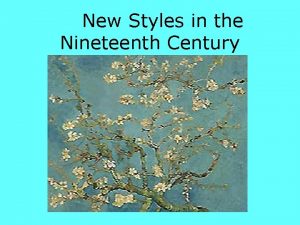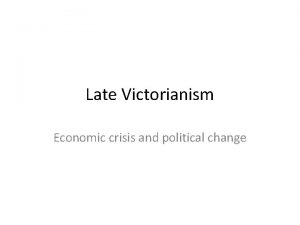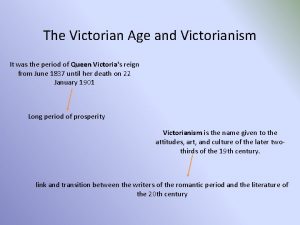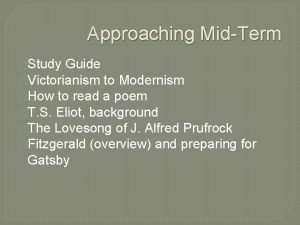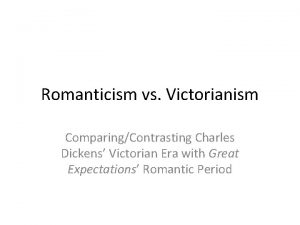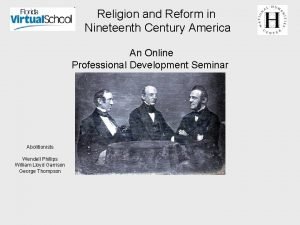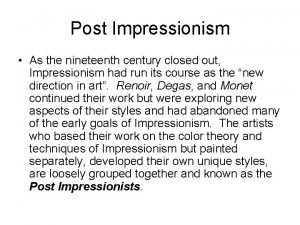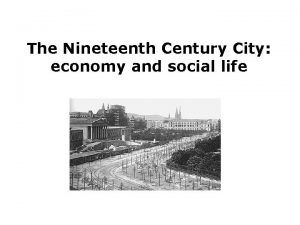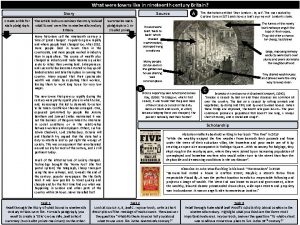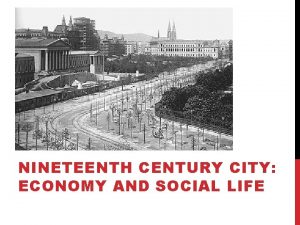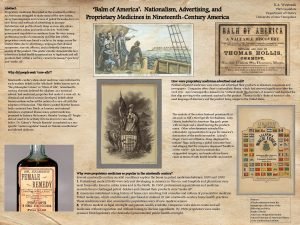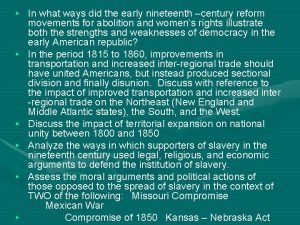Victorianism MA 8 Cultural spaces the nineteenth century





































- Slides: 37

Victorianism MA 8 Cultural spaces

• „the nineteenth century, like no other century, was addicted to dwelling. It conceived the residence as the receptacle for the person, and it encased him with all his appurtenances so deeply in the dwelling's interior that one might be reminded of a compass case, where the instrument with all its accessories lies embedded in deep, usually violet folds of velvet. What didn't the nineteenth century invent some sort of casing for!" (Walter Benjamin)

• "The space disguises itself-puts on, like an alluring creature, the costume of moods. The self-satisfied burgher should know something of the feeling that the next room might have witnessed the coronation of Charlemagne as well as the assassination of Henry IV, the signing of the Treaty of Verdun [. . . ]. In the end, things are merely mannequins, and even the great moments of world history are only costumes beneath which they exchange glances of complicity with nothingness, with the petty and the banal. Such nihilism is the innermost core of bourgeois coziness [. . . ]. To live in these interiors was to have woven a dense fabric about oneself within a spider's web, in whose toils world events hang loosely suspended like so many insect bodies sucked dry”. (Walter Benjamin)

• “Miss Mitford, it is true, was much confined to the cottage. She had to read aloud to her father hour after hour; then to play cribbage; then, when at last he slumbered, to write and write at the table in the greenhouse in the attempt to pay their bills and settle their debts. ” (Woolf, Flush)

• “At last, however, the door of number fifty was flung wide; Miss Mitford and Flush were ushered in. Miss Mitford was a frequent visitor; there was nothing to surprise, though something to subdue her, in the sight of the Barrett family mansion. But the effect upon Flush must have been overwhelming in the extreme. Until this moment he had set foot in no house but the working man’s cottage at Three Mile Cross. The boards there were bare; the mats were frayed; the chairs were cheap. Here there was nothing bare, nothing frayed, nothing cheap — that Flush could see at a glance. Mr. Barrett, the owner, was a rich merchant; he had a large family of grown-up sons and daughters, and a retinue, proportionately large, of servants. His house was furnished in the fashion of the late thirties, with some tincture, no doubt, of that Eastern fantasy which had led him when he built a house in Shropshire to adorn it with the domes and crescents of Moorish architecture. Here in Wimpole Street such extravagance would not be allowed; but we may suppose that the high dark rooms were full of ottomans and carved mahogany; tables were twisted; filigree ornaments stood upon them; daggers and swords hung upon wine-dark walls; curious objects brought from his East Indian property stood in recesses, and thick rich carpets clothed the floors. ” (Woolf, Flush)

• “But as Flush trotted up behind Miss Mitford, who was behind the butler, he was more astonished by what he smelt than by what he saw. Up the funnel of the staircase came warm whiffs of joints roasting, of fowls basting, of soups simmering — ravishing almost as food itself to nostrils used to the meagre savour of Kerenhappock’s penurious frys and hashes. Mixing with the smell of food were further smells — smells of cedarwood and sandalwood and mahogany; scents of male bodies and female bodies; of men servants and maid servants; of coats and trousers; of crinolines and mantles; of curtains of tapestry, of curtains of plush; of coal dust and fog; of wine and cigars. Each room as he passed it — dining-room, drawing-room, library, bedroom — wafted out its own contribution to the general stew; while, as he set down first one paw and then another, each was caressed and retained by the sensuality of rich pile carpets closing amorously over it. At length they reached a closed door at the back of the house. A gentle tap was given; gently the door was opened. ” (Woolf, Flush)

Victorian interior


• “Miss Barrett’s bedroom — for such it was — must by all accounts have been dark. The light, normally obscured by a curtain of green damask, was in summer further dimmed by the ivy, the scarlet runners, the convolvuluses and the nasturtiums which grew in the window-box. At first Flush could distinguish nothing in the pale greenish gloom but five white globes glimmering mysteriously in mid-air. But again it was the smell of the room that overpowered him. Only a scholar who has descended step by step into a mausoleum and there finds himself in a crypt, crusted with fungus, slimy with mould, exuding sour smells of decay and antiquity, while halfobliterated marble busts gleam in mid-air and all is dimly seen by the light of the small swinging lamp which he holds, and dips and turns, glancing now here, now there — only the sensations of such an explorer into the buried vaults of a ruined city can compare with the riot of emotions that flooded Flush’s nerves as he stood for the first time in an invalid’s bedroom, in Wimpole Street, and smelt eau de cologne. ” (Woolf, Flush)

• “Very slowly, very dimly, with much sniffing and pawing, Flush by degrees distinguished the outlines of several articles of furniture. That huge object by the window was perhaps a wardrobe. Next to it stood, conceivably, a chest of drawers. In the middle of the room swam up to the surface what seemed to be a table with a ring round it; and then the vague amorphous shapes of armchair and table emerged. But everything was disguised. On top of the wardrobe stood three white busts; the chest of drawers was surmounted by a bookcase; the bookcase was pasted over with crimson merino; the washingtable had a coronal of shelves upon it; on top of the shelves that were on top of the washing-table stood two more busts. Nothing in the room was itself; everything was something else. Even the window-blind was not a simple muslin blind; it was a painted fabric with a design of castles and gateways and groves of trees, and there were several peasants taking a walk. Looking-glasses further distorted these already distorted objects so that there seemed to be ten busts of ten poets instead of five; four tables instead of two. ” (Woolf, Flush – emphasis added)

















The Gentlemen’s Clubs 1 • • • 19 th-century phenomenon Function: coffee houses (18 th century) Membership Related to extension of franchise (gentleman) Boom: 1880 s (400 in London – mainly West End: clubland) • Social, political and gender boundaries • Exclusivity (members; perhaps invited guests) • Shared interests (business; arts and literature; sports)

The Gentlemen’s Clubs 2 • Relaxation; • Free from the presence of women (escape from family); • Male social bonding • Exception: The University Women’s Club (1883) • Services: meals, games, reading, accommodation • Even today: – most exclude women/are single-sex clubs – membership-based (very high fees)

The Athenaeum

Famous Athenaeum members • • • Matthew Arnold J. M. Barrie Gilbert Keith Chesterton Winston Churchill Joseph Conrad Charles Darwin Charles Dickens Isaac D'Israeli Sir Arthur Conan Doyle T. S. Eliot Michael Faraday • • • Thomas Hardy Rudyard Kipling Thomas Moore Lord Palmerston Herbert Spencer William Makepeace Thackeray Arnold J. Toynbee Anthony Trollope, J. M. W. Turner, W. B. Yeats

Virginia Woolf, The Years • Colonel Abel Pargiter was sitting after luncheon in his club talking. Since his companions in the leather armchairs were men of his own type, men who had been soldiers, civil servants, men who had now retired, they were reviving with old jokes and stories now their past in India, Africa, Egypt, and then, by a natural transition, they turned to the present. It was a question of some appointment, of some possible appointment. • Suddenly the youngest and the sprucest of the three leant forward. Yesterday he had lunched with. . . Here the voice of the speaker fell. The others bent towards him; with a brief wave of his hand Colonel Abel dismissed the servant who was removing the coffee cups. The three baldish and greyish heads remained close together for a few minutes. Then Colonel Abel threw himself back in his chair.

The New Woman • Joan Riviere, ‘Womanliness as a Masquerade’ (1929) • New Woman was constructed ‘as simultaneously non-female, unfeminine and ultra-feminine. ’ (Pykett 1992: 140) • What are the basic characteristics of the New Woman? She is trying to make a better life for women. Above all she is striving for equality of opportunity with man to enjoy full life, and she seeks the right to make decisions for herself, the right to determine her own destiny. … The Woman of Tradition has … accepted life as it comes. By contrast the New Woman strives to mould her own life in the way that she would wish it. …. Besides the right to determine her own personal destiny, the New Woman demands a say in the development of the society in which she lives. ’ (Meares 9 -10, 11, 18, 21, emphases in original)

The New Woman (? )

‘Speaks for itself’, Hub, 17 October 1896

The New Woman: Butch or Lady?

‘The Championess’

Sarah Grand, ‘The New Aspect of the Woman Question’ (1894) • ‘The man of the future will be better, while the woman will be stronger and wiser. To bring this about is the whole aim and object of the present struggle, and with the discovery of the means lies the solution of the Woman Question. ’ (Grand 1894 a: 31). • [The Old Woman is] ‘unaccustomed to the practice which the New Woman has adopted, of exposing the sores of Society in order to diagnose its diseases, and find a remedy for them’ (Grand 1898 a: 71)
 Romanticism vs victorianism
Romanticism vs victorianism Romanticism vs victorianism
Romanticism vs victorianism Fiber weave patterns forensics
Fiber weave patterns forensics Nineteenth century
Nineteenth century The early and mid-nineteenth century: romanticism
The early and mid-nineteenth century: romanticism Horace taylor the verdict september 25 1899
Horace taylor the verdict september 25 1899 Conservatism buzzwords
Conservatism buzzwords Wild swans poem
Wild swans poem Thế nào là mạng điện lắp đặt kiểu nổi
Thế nào là mạng điện lắp đặt kiểu nổi Dạng đột biến một nhiễm là
Dạng đột biến một nhiễm là Hát lên người ơi alleluia
Hát lên người ơi alleluia Biện pháp chống mỏi cơ
Biện pháp chống mỏi cơ Vẽ hình chiếu đứng bằng cạnh của vật thể
Vẽ hình chiếu đứng bằng cạnh của vật thể Phản ứng thế ankan
Phản ứng thế ankan Môn thể thao bắt đầu bằng từ đua
Môn thể thao bắt đầu bằng từ đua Thiếu nhi thế giới liên hoan
Thiếu nhi thế giới liên hoan Khi nào hổ con có thể sống độc lập
Khi nào hổ con có thể sống độc lập điện thế nghỉ
điện thế nghỉ Một số thể thơ truyền thống
Một số thể thơ truyền thống Tỉ lệ cơ thể trẻ em
Tỉ lệ cơ thể trẻ em Trời xanh đây là của chúng ta thể thơ
Trời xanh đây là của chúng ta thể thơ Số nguyên tố là gì
Số nguyên tố là gì Vẽ hình chiếu vuông góc của vật thể sau
Vẽ hình chiếu vuông góc của vật thể sau Hát kết hợp bộ gõ cơ thể
Hát kết hợp bộ gõ cơ thể Các châu lục và đại dương trên thế giới
Các châu lục và đại dương trên thế giới Thế nào là hệ số cao nhất
Thế nào là hệ số cao nhất ưu thế lai là gì
ưu thế lai là gì Sơ đồ cơ thể người
Sơ đồ cơ thể người Tư thế ngồi viết
Tư thế ngồi viết Cái miệng nó xinh thế
Cái miệng nó xinh thế đặc điểm cơ thể của người tối cổ
đặc điểm cơ thể của người tối cổ Chó sói
Chó sói Mật thư tọa độ 5x5
Mật thư tọa độ 5x5 Tư thế ngồi viết
Tư thế ngồi viết Thẻ vin
Thẻ vin Slidetodoc
Slidetodoc Thể thơ truyền thống
Thể thơ truyền thống Các châu lục và đại dương trên thế giới
Các châu lục và đại dương trên thế giới



